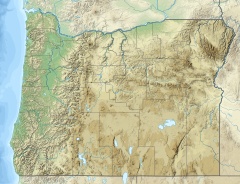The Diamond Craters is a monogenetic volcanic field about 40 miles (64 km) southeast of Burns, Oregon. The field consists of a 27-square-mile (70 km2) area of basaltic lava flows, cinder cones, and maars. The reexamination of radiocarbon dates from older studies and interpretation of paleomagnetic data and new radiocarbon dates limits the eruption of volcanic vents in this volcanic field to the time period between 7320 and 7790 calendar years B.P.[2][3]
| Diamond Craters | |
|---|---|
 Malheur Maar, the only lake-filled maar in Diamond Craters | |
| Highest point | |
| Elevation | 4,707 ft (1,435 m)[1] |
| Coordinates | 43°06′N 118°45′W / 43.1°N 118.75°W[1] |
| Geography | |
| Location | Harney County, Oregon, U.S. |
| Parent range | Basin and Range |
| Topo map | USGS Diamond Swamp |
| Geology | |
| Rock age | 7320 to 7790 calendar years. B.P.[2] |
| Mountain type | Volcanic field / shield volcano |
| Climbing | |
| Easiest route | roads and trails |
Diamond Craters and the nearby Diamond post office were named after the Diamond Ranch, established in the area by the pioneer Mace McCoy. The ranch used a diamond-shaped brand, hence the name.[3][4]
In the 1970s, Diamond Craters was a source of controversy between the Bureau of Land Management and commercial stonecutters who were illegally removing slabs of lava to sell as veneer for fireplaces, home exteriors, and chimneys.[5] Geologists familiar with the area cited the craters' unusual research value, a "museum of basaltic volcanic features" apt to be destroyed by slab harvesting and associated heavy equipment.[5] In 1982, the area gained additional protection when it was designated an Outstanding Natural Area.[4]
Notable vents
edit| Name | Elevation | Coordinates | Last eruption |
| Big Bomb Crater[1][6] | 1,308 m (4,291 ft) | 43° 04' 34.64" N, 118° 44' 59.13" W | - |
| Central Crater Complex[1][6] | 1,378 m (4,521 ft) | 43° 05' 38.48" N, 118° 47' 08.53" W | - |
| Cloverleaf Crater[1][6] | - | 43° 05' 21.54" N, 118° 43' 58.84" W | - |
| Dry Maar[1][6] | 1,268 m (4,160 ft) | 43° 06' 11.92" N, 118° 49' 04.55" W | - |
| East Twin Crater[1][6] | 1,326 m (4,350 ft) | 43° 05' 52.83" N, 118° 48' 19.46" W | - |
| Keyhole Explosion Crater[1][6] | - | 43° 05' 07.30" N, 118° 45' 30.12" W | - |
| Lava Pit Crater[1][6] | 1,305 m (4,281 ft) | 43° 04' 32.66" N, 118° 45' 24.06" W | - |
| Little Red Cone[1][6] | - | 43° 06' 11.57" N, 118° 44' 44.17" W | - |
| Malheur Maar[1][6] | 1,286 m (4,219 ft) | 43° 06' 14.68" N, 118° 48' 59.54" W | - |
| Nolf Crater[1][7] | - | 43° 06' 26.54" N, 118° 48' 15.60" W | - |
| Oval Crater[1][6] | - | 43° 04' 56.85" N, 118° 45' 56.88" W | - |
| Red Bomb Crater[1][6] | 1,323 m (4,341 ft) | 43° 04' 39.94" N, 118° 46' 08.23" W | - |
| West Twin Crater[1][6] | 1,326 m (4,350 ft) | 43° 05' 56.52" N, 118° 48' 31.70" W | - |
References
edit- ^ a b c d e f g h i j k l m n o "Diamond Craters". Global Volcanism Program. Smithsonian Institution.
- ^ a b Sherrod, D.R., D.E. Champion, and J.P. McGeehin (2012) Age and duration of volcanic activity at Diamond Craters, southeastern Oregon. Journal of Volcanology and Geothermal Research. 247–248:108–114
- ^ a b Peterson, N.V. and Groh, E.A., 1964. Diamond Craters, Oregon. Ore Bin, 26(2), pp.17-34.
- ^ a b McArthur, Lewis A.; McArthur, Lewis L. (2003) [1928]. Oregon Geographic Names (7th ed.). Portland, Oregon: Oregon Historical Society Press. p. 286. ISBN 0-87595-277-1.
- ^ a b Hofferber, Connie (August 3, 1979). "BLM, Stonecutters Square Off Over Mining Diamond Craters". The Oregonian. p. 69. Retrieved January 4, 2016 – via NewsBank.
- ^ a b c d e f g h i j k l Bureau of Land Management, 2021. Diamond Craters Outstanding Natural Area. Bureau of Land Management, Washington, D.C. 1 map.
- ^ Mehringer, P.J., and P.E. Wigand. 1990. Comparison of late Holocene environments from woodrat middens and pollen. Pages 294–325 in J.L. Betancourt, T.R. Van Devender, and P.S. Martin (eds.). Packrat middens: the last 40,000 years of biotic change. University of Arizona Press, Tucson.
